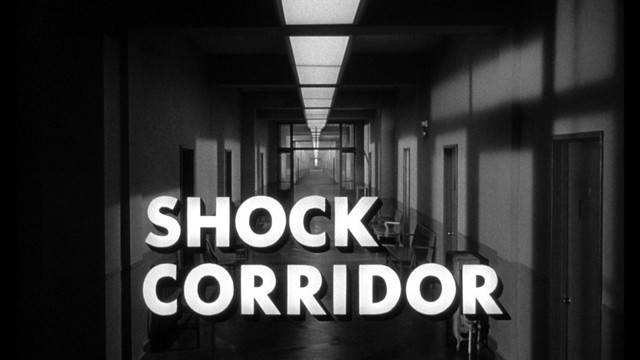
When I saw Hitchcock's Spellbound, I was so frustrated with the silly, ignorant depiction of psychoanalysis and dream-analysis that I couldn't enjoy the film. Everything about Spellbound hinges on psychoanalysis working a way that is so obviously unrealistic, an unresearched explanation of an at-the-time new school of thought, and if I couldn't accept the basic premise then I couldn't accept the story built on it. I had the same trouble with Inception, which depends entirely on an artificially constructed series of rules about dreaming, only I have to admit that on second watching I was able to accept the in-story rules and enjoy the film. Perhaps I owe Spellbound another try. Salvador Dalí directed the dream sequences, after all.
The same sort of phenomenon is at work in Shock Corridor, although to be honest it doesn't so much ruin my enjoyment of the film as it does color it. Like Inception, I can say, okay, inside this story the rules work this way, and within those rules as long as we stay consistent I can enjoy the story. Like Inception and like Spellbound, the main drama and the concepts and themes that drive the story are just as valid, whether or not psychoanalysis, or dream states, or clinical insanity work in real life the way they do in the stories.
This feels like "exploitation cinema" with a conscience and a soapbox, which works better than maybe it should. (It's not my first time seeing it, but it's been a while and I only half-remembered it.) Each of the three witnesses Barrett has to interview have convenient lapses into sanity for him, but in each case the lapses teach us that their breaks from reality were the direct and singular result of primary political movements of the last ten or twenty years: the communist scare and shame of succumbing to a different ideology drove the first witness mad; racial segregation and hatred in the south did in the second; and the construction and deployment of the hydrogen bomb was the burden of the third.
It struck me as interesting that while these large-scale American problems were being exposed as ugly and messy and soul-destroying, our hero was monomaniacally obsessed with such a petty thing: the murder of another patient. But it's not that one single murder in an insane asylum outweighs the impact of all American history for Johnny Barrett: it's that his Pulitzer Prize-winning story, his own fame and glory, outweighs all the carnage and wounded souls of recent American history. Not a very flattering approach to a hero, I've got to say.
A lot could also be said (and no doubt has been said) about the particulars here. His girlfriend -- who is pretending against her will to be his sister -- is a stripper. The soldier-turned-communist-turned-pariah has reverted back to a general on the losing side of an older, equally hate-filled conflict: the U.S. Civil War -- a position which would make him a pariah by modern eyes but a hero in his own. The first black student in a desegregated college has taken on the role of his own oppressor, chasing black men and "founding" the Ku Klux Klan as a way to keep other blacks from "marrying his daughter." And the "most brilliant mind the United States," the doctor responsible for the H-bomb (this story's Oppenheimer, or Dr. Felix Hoenikker) has become an innocent child who only wants to play games. Meanwhile, of course, the reporter hellbent on solving a case and writing an award-winning story is driven insane by the conditions and environmental pressures within the asylum -- of course one of the primary themes here is that asylums do not make people better, but simply foster and incubate more madness (the doctors even say as much, plain as day, at the end).
You can smell the tragedy of the end a mile off, but Samuel Fuller and his cast make it a lot of fun getting there. This film comes after the novel One Flew Over the Cuckoo's Nest (though an excerpt of his autobiography suggests that the idea for this story dates back for Fuller to at least the late 40s, when he wrote for Fritz Lang and Douglas Sirk), but it's hard to imagine that a lot of asylum-centric films like Cuckoo's Nest and 12 Monkeys weren't greatly influenced by the world and tone presented here.

No comments:
Post a Comment